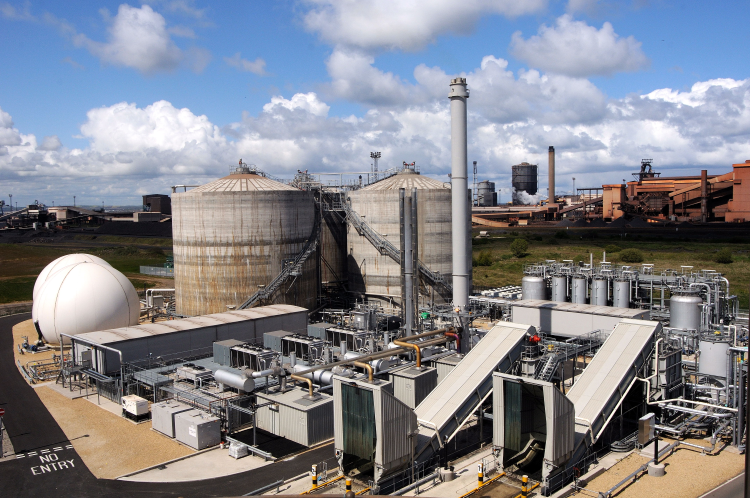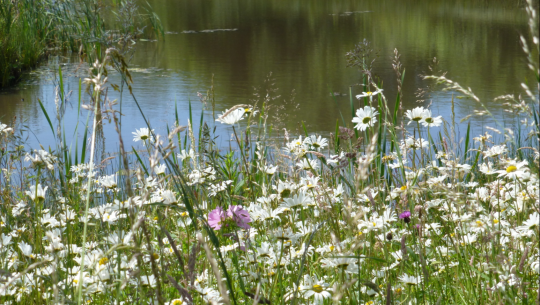
Reporting back on what we’ve done and what our plans for the future.
At NWG we understand that the financial value of the business is only one measure of its success. To make sure we deliver on our purpose, we must understand our impact and dependence on the natural world, society and our employees. We believe in taking a long term view and want to leave a positive legacy in the areas where we operate.
The performance of a business is frequently measured on its financial return in isolation of any other contributing factors, yet within a business, to ensure it is running efficiently, human, environmental and social indicators are also used. Putting those alongside financial indicators and indicators about the physical assets the company owns provides a far more integrated picture of our performance.
At NWG we want to ensure that the measures and indicators we are using do provide that holistic, integrated picture. We want the measures we use to be consistent and hopefully comparable across the industry and within the broader business world.
We want to truly understand the complete impact of our decisions. To enable us to have that integrated view of how we are performing, we need to be able to measure and monitor those impacts, both positive and negative.
Case studies
Across the country we have some significant challenges to face when it comes to resource sustainability and resilience.
There is real confidence in the predictions that we are going to see more extreme weather events as a result of a changing climate – for us this means we need to be prepared for when there is not enough water and when we have far too much at once, leading to flooding.
“I can remember a time when nature conservation and development were seen to be in opposition - you either developed or conserved - and that led to confrontation. Here at Abberton Reservoir this is fundamentally, extraordinarily and wonderfully different. This development has been constructed hand-in-hand to create a wonderment for people and wildlife who live and visit here and a godsend for people who depend on it for water.”
Sir David Attenborough
In order to ensure a resilient supply of water in the driest county in the country, in Essex we have invested £150million to complete the Abberton Scheme. Following more than 20 years of investigation, consultation and detailed planning, the reservoir was expanded by 58% to hold an additional 15 billion litres of water. This helped secure supplies to our 1.5 million customers in Essex for the next 25 years and beyond.
Abberton Reservoir is one of the most important habitats for overwintering wildfowl in Europe and is protected as such by international designations making this a particularly special project. From the outset, we looked at how we might make this site even more special for wildlife as part of the project.
We designed the scheme to secure future growth and make significant environmental enhancement at the same time. As well as securing water supplies, we vastly extended the important habitats at the site; for example creating over 200ha of new wetland habitat.
The environmental enhancements and partnership approach we adopted, resulted in being honoured by world renowned naturalist and broadcaster, Sir David Attenborough joining us to officially open the scheme.
During 2016 work continued to further the environmental enhancements at the site; including further areas of reed beds, grassland management and hedge planting,
Working in catchments is fundamental to the resilience of our business and plays a critical part in how we think and operate. We have a long history of working in partnerships and actively contributing to partnerships in catchments across our entire supply area.
We recognise that looking at the whole catchment area is key to making sure we supply clean, clear drinking water that tastes great to our customers now and in the future. In addition to improving water quality, taking a catchment based approach is helping us reduce the risk of flooding and improve biodiversity. To look after the entire catchment, we work in partnership with others.
By working in partnership, we are able to pool resources and knowledge to better understand our catchments and work more effectively to address any environmental issues. We have been looking ahead to what we hope to achieve in 2020-25 and launched our new partnership scheme ‘Improving the Water Environment’ in July. We’ve also been engaging our partners in our proposals for holistic catchment projects in the South Tyne and in Essex; and in developing catchment approaches to balancing nutrients.
A key catchment partnership project that we continue to be involved in is the £6 million Pennine PeatLIFE project. This started in November 2017 and will focus on areas of the North Pennines, Yorkshire Dales and Forest of Bowland, repairing 1,535ha of damaged areas of blanket bog or ‘peat bog’ over the next four years.
13% of the world’s resource of ‘peat bog’ is found in the UK. Once restored, it provides homes for wildlife, stores carbon to help combat climate change and helps filter clean water. Water quality benefits will be delivered through the project, benefiting the uplands; delivering upstream solutions for the benefits of our downstream customers.
This project is led by the North Pennines Area of Outstanding Natural Beauty (AONB) Partnership in collaboration with Yorkshire Wildlife Trust and Forest of Bowland AONB Partnership. It is financed by the European Union’s LIFE Programme, Environment Agency, Yorkshire Water and United Utilities. We also help finance the project and sit on the board of the partnership, advising on peat restoration, supporting with water quality sampling and monitoring in the uplands. The project will also test innovative ways of funding, identifying new approaches to paying for environmental improvements with multiple benefits for everyone.
We are determined to bring down leakage across our network, and have been utilising a number of innovative new techniques to help us achieve our goal.
This includes harnessing the power of space satellites to help us spot leaks on the ground. Utilising the same technology that helps find water on other planets, we can capture detailed imagery that is sent to our leakage technicians so they can carry out further investigations.
The first phase of activity is primarily focused on large trunk mains that often run through rural areas. These are particularly difficult to identify leaks on due to the terrain and the geography of the region.
The sheer speed of the process, the detail it gives and the distances the images cover will help us further improve our leakage.
We have also brought a four-legged friend on board to help us battle leakage! – Denzel is a springer spaniel who has been trained to sniff out and locate leaks by recognising the tiniest traces of chlorine use to disinfect our water supplies.

Our customers can also be a great help to us by reporting leaks to us when they see them so we can investigate and fix them as quickly as possible. In 2018 we launched our new online interactive leak map, so make it easier than ever for customers to report leaks to us.
The simple online map allows customers to check if a leak has already been reported to us, and send us details if we don’t already know about it. Customers can provide details on the type of leak and even upload their own photos so we can tell how urgent it is. Once a leak has been reported to us we provide updates on the action we are taking, so our customers can track the progress we are making on repairs.
Our 2018-19 leakage target was 203Ml/d and the reported figures were 200.43Ml/d. Compared with the 2017/18 reported figure of 203.22Ml/d, our leakage performance has shown reduction of 2.79Ml/d from year to year.
Nick Haskins from SUEZ, who are exclusive representatives of Utilis in the U.K. and Ireland, is delighted to be partnering with Northumbrian water on this innovation and cutting-edge technology, he said: "We're very excited to be teaming up with Essex & Suffolk Water on this project and are really excited to see what impact it can have on the company′s performance around leakage. Using satellite technology to locate and fix water leaks is the most up-to-date and innovative method there is out there and it gives water companies the ability to survey the whole water pipe network in a single operation. This, of course, has the added benefit of being completely discreet to the customer and without any disruption to them."
We use the waste customers flush down the toilet, as a fuel, and turn it into electricity and gas which people then use to heat their homes and cook their meals.
We are the first water company in the country to use all of the sewage sludge (the material left over at the end of the sewage treatment process) to produce gas and electricity. We’ve transformed sewage sludge, from being a waste product into a fuel being used to produce green energy.
We have invested £75million in Thermal Hydrolysis Advanced Anaerobic Digestion (AAD). The procedure uses a natural, biological process which involves taking leftover sewage sludge and heating it in something similar to a giant pressure cooker.
Tony Rutherford, Sludge Process Optimisation Controller at Northumbrian Water, said: “It’s fantastic to see our Advanced Anaerobic Digestion process brought to life in this way for what will be the biggest event in England this year.
“AAD takes the waste we flush away and creates power from it, which is then returned to the National Grid. It’s a real example of the circular economy in action, because you can imagine the power created being used in the homes that the waste came from, possibly even to cook food, bringing the whole process through a full cycle.
“It’ll be great to see this model in place alongside representations of other amazing things created in the North of England and I think visitors young and old will find it fascinating.”

Our Howdon and Bran Sands AAD sites convert 100% of our sewage sludge to biogas and then into renewable electricity. Back in 2017 at our AAD plant at Howdon we made the “power from poo” process even more efficient by building a pioneering £8m gas to grid plant, which is the largest in the water industry. Biogas is upgraded after the AAD process by removing the carbon dioxide so the purified gas can by directly injected into the national gas grid. We added a further investment into gas to grid at Bran Sands in late 2019.
Results are impressive. By moving the sludge as a cake rather than a liquid we have reduced our carbon footprint from 90,000 tankers per annum to 10,000 trailers annually.
SuDS are an alternative to building more engineering infrastructure – they include ponds, rainwater gardens and grassed areas that store surface water temporarily.
Rainwise is about using data from planning authorities and the Environment Agency to spot areas that have flooded or may flood in future; then working with the communities to explore the best solutions for them. As well as our physical installation schemes, we raise awareness among parish councils, schools and residents about how they can get involved in creating their own small-scale ones, e.g. installing water butts. This helps free-up capacity in the sewer network.
Rainwise combined with ‘SuDS for Schools’ – our educational programme that teaches young people about flooding, climate change and biodiversity. The rain gardens and planters we install at the schools can also be used by teachers as part of the curriculum.
We try to get as many other benefits as possible from each Rainwise scheme, including reducing pollution risk, improving biodiversity and wildlife habitats, and green spaces for health and wellbeing.
Rainwise started in 2015 and we’ve made big strides towards our goal of reducing flood risk for 7,200 properties by 2020 – through £40m investment in schemes large and small, across the North-East, which have had customer participation at their heart.
Andy Hudson, Headteacher of Mickley First School, said: “We were delighted to be asked to take part in this new scheme and the children had a fantastic morning getting their hands dirty. With the support of Northumbrian Water employees, they made rain gauges, explored permeability of materials and planted flowers in our new planters. As a result, the children understand they can have an impact, however small, on their area and we hope that through being involved in this project it will encourage others to take action to help reduce the impact of flooding.
Refill is a national initiative that received significant media coverage when it launched in January 2018.
We wanted to take a key position in the battle to reduce the waste produced by single-use plastic bottles. This is one of the ways we’re making the most of our natural capital.
The campaign started with a conversation with the not-for-profit organisation ‘City To Sea’ at our 2017 Innovation Festival about reducing the use of single-use plastics. There, we spotted that businesses in our regions wanted to take action to engage with their customers on solving this issue. Our Corporate Communications team took the lead in developing and launching the Refill campaign – a national network of high street retailers, coffee shops, businesses and local authorities offering new refill stations for the public to top-up their water bottles for free. We first launched in Durham in November 2017, with schemes in Darlington, Chelmsford, Lowestoft, Brentwood, Newcastle and many other now launched. We are still rolling-out the campaign further across all of our operating areas – we have more than 1,000 partners involved so far, and this number is growing rapidly.
Other water companies followed our lead, joining forces in a water industry-wide approach that took the campaign national. The goal is for the network to extend to every major city and town in England by 2021.
People can use a smartphone app to find out where the nearest refill point is, or look out for special signs in shop windows. It’s estimated the scheme will cut plastic bottle use by tens of millions each year, as well as hugely increasing the ready availability of high quality drinking water.
Cllr Simon Walsh, Chairman of Essex Waste Partnership said: "The Refill scheme provides a fantastic opportunity for local authorities and water companies to work with local businesses to provide free and easily accessible tap water to everyone in Essex. Refill Essex will play an important role in promoting a more sustainable Essex, through the use of reusable water bottles at refill stations. Reusable items such as water bottles and coffee cups can dramatically decrease the number of single-use items being thrown away across Essex, which will also reduce litter."
We are leading the way in the use of green energy.
Not only do we continue to make ‘power from poo’ through using 100% of our sewage sludge to generate energy, a large portion of our power requirements are now met through long term ‘renewable’ only agreements, specifically from offshore wind farms. This has allowed us to commit to becoming a carbon neutral company by 2027.
We have signed a long-term agreement with Danish renewable energy specialist Ørsted that will see us take almost a third of our renewable energy demand from an offshore wind farm.
The 10-year deal, the first Corporate Power Purchase Agreement (PPA) of its kind in the UK, is an expansion of a renewable electricity supply agreement between the companies, which started in April 2018.

As of March 1, 2019, we source 30% of our renewable electricity directly from the Race Bank Offshore Wind Farm, off the coast of Norfolk. The move further drives our sustainable and renewable energy strategy, building upon existing solar, hydro, gas to grid and advanced anaerobic digestion (AAD) power generation. Race Bank Offshore Wind farm is one of the newest operational wind farms in the UK with its 91 Simens Gamesa 6MW wind turbines having been commissioned earlier this year.
Wastewater Director Richard Warneford said: “We’ve set ourselves some truly ambitious goals here as part of our plan but we aim to go even further and ensure we go above and beyond to protect and improve the environment in everything we do as a company.
“Our ‘Improving the Water Environment’ scheme will see us invest £2m into environmental partnerships to enhance the areas of streams, rivers, lakes, reservoirs, beaches and coastline that our customers can access.
“We will also demonstrate leadership in catchment management, taking care of our water resources, and though our influence on the water environment ensure we provide habitats where wildlife can thrive and where we achieve a net gain in biodiversity.”
With the launch of the collaborative ‘The Water Hub’, we’ve strengthened our partnership with Durham University, Durham County Council and the Environment Agency.
The aim of the initiative is to engage with Small and Medium-sized Enterprises (SMEs) in the North East of England to identify and develop innovative, practical solutions to challenges in the region’s water sector – including key issues like flooding and resilience.
The project, which is funded by the European Regional Development Fund, will help support SMEs through:
- Challenge events that will offer SMEs the chance to work on specific problems to try and find innovative solutions.
- Access to live testing facilities to test and further develop identified solutions. These facilities include residential homes, laboratories and supply chains.
- Innovations partnerships to facilitate the development of new networks of SMEs, partners and researchers with the aim of bringing people together to form new, exciting, collaborations.
- Small grants will be made available by the Water Hub to help support the development of novel ideas. Grants of £1000-£5000 can be made available at different stages in the innovation process and will be fully matched by the SME.
The Water Hub will also provide valuable mentoring and facilitation to SMEs to help develop ideas further, open up new supply chains and connect SMEs with research innovation services across the North East of England.
Our award-winning Water Rangers community initiative contributes to group and help protect our environment. Volunteers are monitoring 56 public access routes next to streams, rivers, becks, burns and bathing waters across the North East.
Water Rangers patrol over 74 kilometres of waterways every week or fortnight, reporting their findings so that any potential pollution can be dealt with quickly, as well as looking out for any water leaks on our distribution network and operational issues such as blocked outfalls, missing / broken covers.
Volunteers receive thorough training about what to look out for and also report on issues such as fly tipping, fallen trees and missing life buoys. They have also received awareness training on flood risk to support the work of the Environment Agency Flood Warden service.
Since the start of the scheme in 2014 until December 2018, a total of 6473 patrols have been completed by volunteers with 380 issues reported to us. There are currently 78 Water Rangers and 22 assistant Water Rangers in the team. The assistants range from young children to teenagers to dogs who help patrol the designated routes.
In 2018/2019 we had the best performance to date in terms of issues reported and self-reports to the Environment Agency since the launch of the scheme. River Guardians were introduced in Teesside where we trained 39 volunteers in pollution awareness; this was delivered in partnership with the River Tees Rediscovered and the Environment Agency.
We committed to a bold new project, working with National Entergy Action (NEA), the charity that leads in tackling fuel poverty.
At the forefront of this is our unique commitment to eradicate Water Poverty across all the areas we serve by 2030 – an industry first in recognising it, challenging all of its causes and making the necessary investment to make a difference to the lives of our most vulnerable customers.
We define household paying more than 3% of their income on water, after housing costs, as being in Water Poverty. It is estimated around 400,000 customers are living in water poverty across our regions.
With NEA we established the national Zero Water Poverty Unit, with Jess Cook appointed as the new Project Development Manager to drive this work forward. Learning from work in the Energy Sector on Fuel Poverty, we are exploring and modelling different ways of eliminating water poverty with our customers. This is a multi-year commitment to continuously improve how we take on the challenge of Water Poverty that also offers opportunities for the wider water, and utilities sector, to take on the challenges set by Ofwat and Ofgem.
As part of delivering this commitment the ‘Water without the Worry’ initiative was launched – an umbrella campaign that brought together all of our inclusivity work under one banner. With a concept researched to target appropriate customers, provide clarity for our employees and link together all of our services – from social tariffs to worrying about a leak, the priority services register to metering – this campaign demonstrates the holistic, whole company response to tackling on Water Poverty.
Adam Scorer, Chief Executive, NEA, said: “This is a tremendously exciting project. We are delighted to use our 35 years’ experience tackling fuel poverty to help better understand and tackle water poverty. People who struggle to afford a warm and dry home will struggle to afford other essential services, such as water. Understanding what works and how it can be applied in energy and water should bring benefits to both sectors and we look forward to working with NWG, and other water stakeholders, to help make it happen.”
We were delighted that at the Water Industry Awards 2019 our Water Without the Worry scheme was named Customer Service Initiative of the Year and our Zero Water Poverty modelling was awarded Data Project of the Year - both cited as being innovative and leading in the field.


